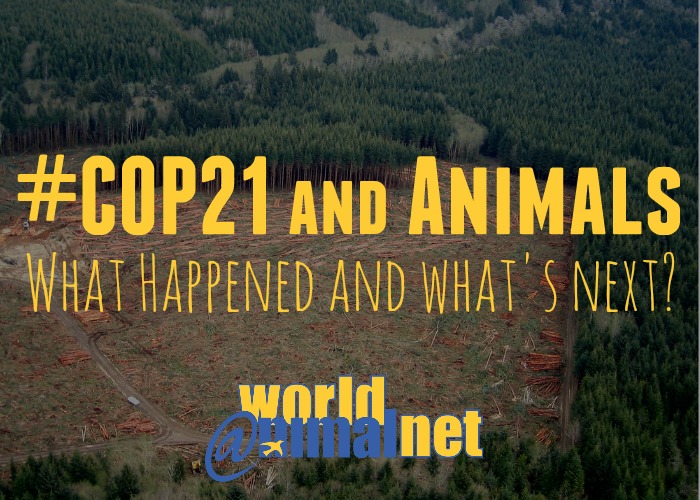 The agreement has yielded mixed reviews from climate activists, thus far. Some argue that the agreement does not go far enough to avoid certain calamity. Others say that the goals agreed upon will require monumental efforts by nations. But one verdict is clear: the agreement marks the end of the beginning of what needs to be done to protect the planet and all its inhabitants. We at World Animal Net believe there is actually a simple solution to perhaps the greatest challenge facing civilization as we know it. As stated in our earlier blog on COP21,
The agreement has yielded mixed reviews from climate activists, thus far. Some argue that the agreement does not go far enough to avoid certain calamity. Others say that the goals agreed upon will require monumental efforts by nations. But one verdict is clear: the agreement marks the end of the beginning of what needs to be done to protect the planet and all its inhabitants. We at World Animal Net believe there is actually a simple solution to perhaps the greatest challenge facing civilization as we know it. As stated in our earlier blog on COP21,
We must ensure that policy makers take action now to support and encourage food consumption and production systems that minimise climate change impacts, deliver food security and good nutrition, and preserve the well‐being of the planet, future generations and the animals.
So did this happen in the course of COP21?
During the negotiations, there were some hints that the elephant in the room, namely, animal agribusiness, would be addressed as a key contributor to climate change. Here are a few highlights:
Government officials and experts talked meat and climate change…
Organized by Humane Society International and Brighter Green, the side event, entitled, “Meat: the big omission from the talks on emissions. Public understanding and policy options,” brought together leading experts and government officials to discuss the environmental impacts of meat and dairy consumption, as well as potential policy and behavior-change solutions. Speakers included representatives from Chatham House, and government representatives from Brazil, China and the U.S., as well as the European Parliament.
The “impossible” was revealed as possible…
Among the speakers at the COP 21 was Patrick Brown, CEO of Impossible Foods, which seeks to “replace the world's most environmentally destructive industry - animal farming - by making delicious, healthy and affordable meats and cheeses from plant ingredients.” Its first product, the Impossible Burger, is set to make its debut in the United States next year.
Jane Goodall had something to say…
Renowned for her groundbreaking work on the study of chimpanzees, British Primatologist and UN Messenger of Peace, Jane Goodall, didn’t shy away from discussing the serious threat that industrial animal agriculture poses to planet and people. Traveling to bring this message to COP 21 in the context of saving rainforests, she had the following to say in an interview.
In order to feed the billions and billions of cows and pigs and chickens… even if you don’t care about the cruelty… even if you refuse to admit that these are individuals with feelings who feel pain and have emotions… you have to admit huge areas of forest are cut down to grow grain to feed them…
So did Arnold Schwarzennger…
Former California Governor Schwarzenegger also traveled to Paris, urging leaders at COP 21 to act. But one thing that caught us totally by surprise was the former body builder’s strong statements in favor of plant-based eating to curb climate change. Advocating a gradual transition away from meat, he declared, “People will buy in to stop eating meat one or two days a week - you have to start slowly. It's a very big challenge but it doesn't mean it shouldn't be done.”
But will these messages stick?
Only time—and our actions—will tell. Despite the few promising instances above, meat consumption remained largely at the sidelines rather than at the center of the COP 21 talks. Fortunately, animal protection organizations need not wait for policymakers to act. Indeed, the power for the most significant change that may very well save the world as we know it, while improving the lives of animals, lies with every individual. As we turn to post-Paris implementation and awareness, it will be up to the movement to carry the torch.
Photo Credit: Sam Beebe, Ecotrust, used under CC BY 3.0.

